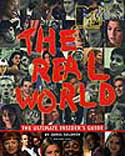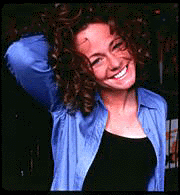Reality Television Shows
This trend of reality television actually being fake can be clearly seen in MTV’s The Real World. The Real World claims to show "what happens when people stop being nice and start becoming real." The show states that six random people are chosen to live together, but this claim is not true. In fact, there is a rigorous screening process where all the non-acceptable candidates are eliminated. This is anything but random. Lindsay, a University of Michigan student was a participant in this year’s Real World in Seattle. She stated how the show did not represent reality mostly because of the presence of the cameras. The "actors" on the Real World knew that there was a camera filming everything they said and did. Lindsay said, "this causes you to constantly think about what you are going to say and how you’re going to say it." Just by having the cameras there caused self-censorship and therefore is already far from being real. Also, the house that they lived in was a studio with large ceilings and lights set up, far from being normal. Instead, in order to leave the house, the participants had to call up someone to follow and film them. In fact, one time while a participant's girlfriend was breaking up with him, a cameraman hid in a ditch filming them, while a microphone was placed in the car. Their emotional scene was captured, unknown to the participant, for the entertainment enjoyment of the television spectator. This lack of privacy is a common theme that a video society will have to deal with.
The Real World claims to show "what happens when people stop being nice and start becoming real." The show states that six random people are chosen to live together, but this claim is not true. In fact, there is a rigorous screening process where all the non-acceptable candidates are eliminated. This is anything but random. Lindsay, a University of Michigan student was a participant in this year’s Real World in Seattle. She stated how the show did not represent reality mostly because of the presence of the cameras. The "actors" on the Real World knew that there was a camera filming everything they said and did. Lindsay said, "this causes you to constantly think about what you are going to say and how you’re going to say it." Just by having the cameras there caused self-censorship and therefore is already far from being real. Also, the house that they lived in was a studio with large ceilings and lights set up, far from being normal. Instead, in order to leave the house, the participants had to call up someone to follow and film them. In fact, one time while a participant's girlfriend was breaking up with him, a cameraman hid in a ditch filming them, while a microphone was placed in the car. Their emotional scene was captured, unknown to the participant, for the entertainment enjoyment of the television spectator. This lack of privacy is a common theme that a video society will have to deal with.
The most interesting thing about the Real World is how, in fact, is a show. The video clips are put together in a way that resembles a narrative, in a similar method to a soap opera. Certain situations over  dramatized by using emotional music and fancy editing. Lindsay told how scenes were taken out of context and other manipulations occurred in order for the show to seem more interesting (and in the end to sell more products on commercial television). Both COPS and the Real World are in fact subjective through the mind of the producer whose goal is to make over dramatic situations out of the mostly unordered reality. While watching these shows, the viewer must question the documentary and not accept them as the truth. This can lead to disastrous results, such as Steve, one member of the Real World, who slapped another member of the cast and now received a couple of death threats. Reality television show participants are actors in the same way that they are directed by who ever makes the producing decisions concerning the show.
dramatized by using emotional music and fancy editing. Lindsay told how scenes were taken out of context and other manipulations occurred in order for the show to seem more interesting (and in the end to sell more products on commercial television). Both COPS and the Real World are in fact subjective through the mind of the producer whose goal is to make over dramatic situations out of the mostly unordered reality. While watching these shows, the viewer must question the documentary and not accept them as the truth. This can lead to disastrous results, such as Steve, one member of the Real World, who slapped another member of the cast and now received a couple of death threats. Reality television show participants are actors in the same way that they are directed by who ever makes the producing decisions concerning the show.
Another interesting trend is the ultra-violent reality show. Being hit by a train or falling out of a ferris wheel now can become a clip on a television show. Not only are disasters filmed, but also Fox’s When Animals Attack show violent images of animals mauling humans. The interesting thing is that for the most part it is the humans who are killing the animals, not the other way around. Videotapes such as Faces of Death take this concept to an extreme where people are "caught on tape" as they die in various violent disasters.
The social impact of the reality television shows is the continuing reinforcement of the get rich quick ideology and the dissociation from reality. Video as a medium is cheap in cost and the potential to make money is great. One minute you could have an idea for an exercise video, and the next you are rich. Video also, inherently dissociates for the actual trends in society by pretending to be displaying the truth. In fact, through editing and other various means, video can distort the actual situation while enforcing stereotypes that are false. Also, by separating the real life violence into the video format, the horror of it all is diminished.
The last and most important point is the issue of privacy that occurs from these reality programs. In an increasingly videotaped society, we are all becoming actors and self-censorship is a common trend. Not are politicians and celebrities the only people who have to beware how they act, but the common person must. In a recent decision by the California Supreme Court, reality programs can be found accountable for invasion of privacy. (Trigoboff, p.12) Privacy is an interesting concept and with the invention of video, who knows how this concepts will be changed. What are the social and psychological necessities for privacy and how can lack of it change us, will be an important question in the future of any video culture.
Source:
--Anderson, Robin. "Reality TV and Criminal Injustice" Humanist vol. 54(5) pp.8-14, 1994.
--Stark, Steven. Glued to the Set. Delta Publishing. New York, NY. 1997.
--Trigoboff, Dan. "Whatcha gonna do? Sue." Broadcasting & Cable. vol. 128 (24) p.32. June 8, 1998.
|<-back to entertainment index|

